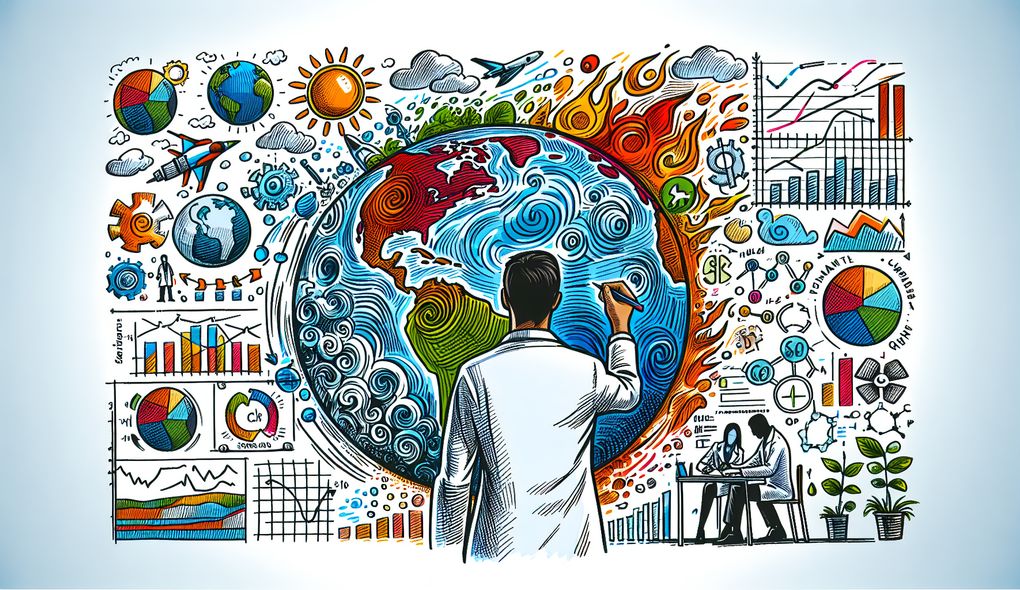What role do you think climate change analysts play in addressing environmental and social justice issues?
SENIOR LEVEL

Sample answer to the question:
Climate change analysts play a crucial role in addressing environmental and social justice issues. They are responsible for conducting research on climate change patterns and their impacts on ecosystems and human societies. They also develop and evaluate the effectiveness of climate change policies and mitigation strategies. Climate change analysts work with cross-functional teams to implement adaptive measures to combat the effects of climate change. Additionally, they communicate complex climate data and research findings to policymakers, stakeholders, and the public. They collaborate with scientists, government agencies, and NGOs to gather and analyze climate data. Climate change analysts also guide junior analysts in climate change research methodologies and best practices in order to advance the field.
Here is a more solid answer:
Climate change analysts play a critical role in addressing environmental and social justice issues. With their strong analytical and problem-solving skills, they conduct advanced research to understand climate change patterns and their impact on ecosystems and human societies. They develop and evaluate climate change policies and mitigation strategies, ensuring their effectiveness in combating climate change. Climate change analysts are also leaders who manage cross-functional teams to implement adaptive measures. Their excellent verbal and written communication skills allow them to effectively communicate complex climate data and research findings to policymakers, stakeholders, and the public. They collaborate with scientists, government agencies, and NGOs to gather and analyze climate data, fostering partnerships to address environmental and social justice issues. Climate change analysts also mentor and guide junior analysts, ensuring the advancement of climate change research methodologies and best practices.
Why is this a more solid answer?
The solid answer expands on the basic answer by emphasizing the candidate's skills and experience in the role of a climate change analyst. It includes specific examples of the candidate's analytical and problem-solving skills, leadership and team management skills, and communication skills. However, it could still provide more specific details about the candidate's experience in engaging and influencing stakeholders.
An example of a exceptional answer:
Climate change analysts play a fundamental role in addressing environmental and social justice issues. They leverage their strong analytical and problem-solving skills to conduct advanced research on climate change patterns, assessing their impacts on ecosystems and human societies. By applying their in-depth knowledge of climate change science and policy, they develop innovative strategies and evaluate existing policies to mitigate climate change risks. As leaders, climate change analysts excel in managing cross-functional teams, fostering collaboration and inspiring colleagues to implement adaptive measures that address environmental and social justice issues. Their exceptional verbal and written communication skills empower them to effectively communicate complex climate data and research findings to policymakers, stakeholders, and the general public. By engaging and influencing stakeholders at all levels, climate change analysts build partnerships with scientists, government agencies, and NGOs to gather and analyze climate data, ensuring evidence-based decision-making. Furthermore, climate change analysts play a crucial role in mentoring and guiding junior analysts, sharing their expertise and contributing to the advancement of climate change research methodologies and best practices.
Why is this an exceptional answer?
The exceptional answer further expands on the solid answer by highlighting the candidate's expertise and impact as a climate change analyst. It showcases their innovative approach to developing strategies and evaluating policies, as well as their ability to engage and influence stakeholders at all levels. The answer also emphasizes the candidate's role in mentoring and guiding junior analysts, demonstrating their commitment to advancing the field of climate change analysis. Overall, the answer provides a comprehensive and compelling perspective on the role of climate change analysts in addressing environmental and social justice issues.
How to prepare for this question:
- Familiarize yourself with climate change science and policy, including current research and initiatives.
- Highlight your experience in conducting advanced research on climate change patterns and their impacts.
- Demonstrate your analytical and problem-solving skills by providing specific examples from past projects or studies.
- Highlight your leadership and team management skills, emphasizing successful collaboration and project implementation.
- Prepare examples of how you have effectively communicated complex climate data and research findings.
- Describe your experience in engaging and influencing stakeholders, including policymakers, stakeholders, and the public.
- Be prepared to discuss your experience in gathering and analyzing climate data, including partnerships with scientists, government agencies, and NGOs.
- Highlight any experience you have in mentoring and guiding junior analysts, demonstrating your commitment to advancing the field.
What are interviewers evaluating with this question?
- Analytical and problem-solving skills
- Verbal and written communication skills
- Knowledge of climate change science and policy
- Leadership and team management skills
- Engaging and influencing stakeholders

